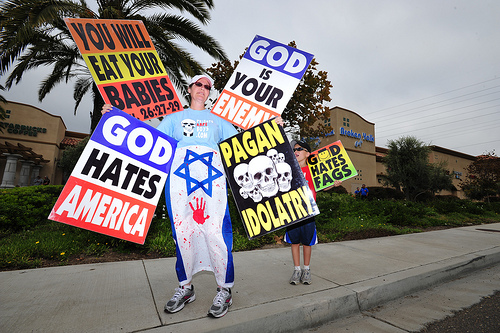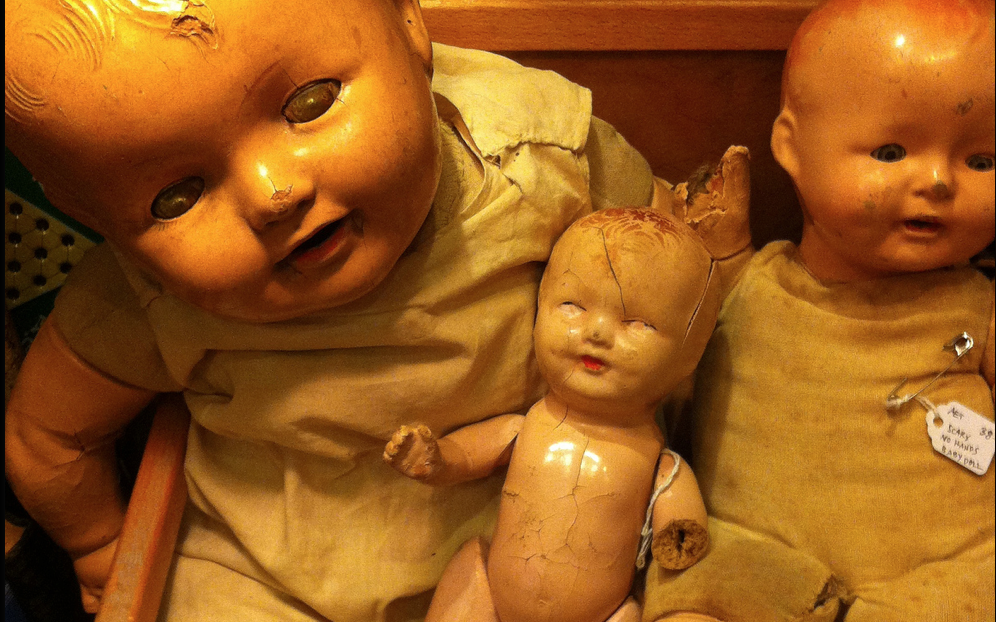AI: Welcome White Lady Shoppers!

After George Zimmerman was acquitted of murder, the talk everywhere was focused how different life is when you’re white vs when you’re not white. Because I’m not an asshole, I got that. I understood that. At least in a way that acknowledges this difference.
But one thing I kept hearing repeatedly was how people of color get followed in stores. I’ve heard this throughout my life. And if I’m honest, I’ll admit I only sort of half believed it. I just believed it as a kind of example that’s not really prevalent but sometimes happens and it’s a representative example situation of something doesn’t happen to white people. I mean, being followed in stores is so creepy. It’s really hard for me to imagine that happening to someone regularly. And it’s even harder for me to imagine that people would actually do that. It’s like the most cliche racist shit. If I worked in a store, I’d probably think to myself, “Wow, you know what would be horribly predictably racist and everyone would hate me if I did it? Following black people around.” Following people is creepy. It’s imposing. It’s terrible customer service. It’s your I’m-an-obviously-super-racist-piece-of-shit tell. Who would even frequent an establishment where employees did that? Who would not fire employees who do that? That can’t be a thing that happens.
Yet, every black person’s story I was hearing about how different our lives are involved a statement about how they get followed around in stores. Not “I was followed when I was a kid.” “I get followed.” Now. In the present. Regularly. And how sometimes that following is less horribly creepy-stalky if they’re dressed in business attire.
It was the first time that it struck me that following is something that HAPPENS HAPPENS. This is not an experience I can even begin to fathom. My experiences as a white woman are so different that these other experiences don’t even make sense to me.
And I spent a lot of time thinking about what it’s like to be in a store as a white woman. I’m often asked if I need any help finding what I need and I either say yes, and get that help, or I say no and I’m left completely alone until I indicate I would no longer like to be left alone… or at least until I look lost or sick.
I know that cell phones used to set off the shoplifter alarms by doors at stores. I know this because for years, I would walk out of a building, an alarm would go off, I’d turn around and look at an employee and they’d say “That’s just your phone.” And they’d wave goodbye to me. No one really ever asked to see my phone, and only occasionally did anyone even ask if I had a phone at all. No one has ever checked my purse or pockets. I’ve never once in my life ever had to talk to security to clear up a situation where an alarm went off.
Hell, I’ve returned home from the mall to realize I had security tags still attached to my clothes.
I’ve gotten gifts with security tags still attached, and I’ve walked into the store without a receipt, told the staff that I got this gift and I needed the sensor removed. And they did it. But what’s more telling is that I know how to remove a security tag from clothes safely because I’ve had to do it enough times since going back to the store always seems like too big of a hassle.
Not only do people not care if I could maybe be a shoplifter, they don’t even care when there’s good reason to believe I probably am in the process of shoplifting.
It’s fairly common that no one bothers to check if I am under the maximum item limit in a dressing room. And usually no one counts how many items I’m bringing in anyway. They ask. I say five or whatever and they hand me the little tag that says five then I give it back to them when I’m done.
These experiences are so hard to reconcile with a world where Barack Obama is followed around these same spaces. And I think it was the first time I really got how blinding white privilege can be. I mean, I knew these things happened. I believed the people who talked about it. But I still kind of envisioned it as the type of thing that happens to young men of color who look like they like rap, not justifiably mind you, but I could at least fathom that. Or occasionally. And mostly by racist asshole in corners of the South. But this happening everywhere? Every day? This makes no sense. This is not how you treat people. It’s so far from the white lady world I live in.
I just can’t understand.
Are you ever forced to think about how your every day experiences are completely colored by how people perceive you? Have you ever had a hard time understanding someone else’s experience because it was so far removed from yours even if you believed them? Are you ever shocked at how other people are treated compared to you?
The Afternoon Inquisition (or AI) is a question posed to you, the Skepchick community. Look for it to appear Sundays, Tuesdays and Thursdays at 3pm ET.





This is not related to race, but I think it may still be relevant. I am depressed, and have been for a long time. I have tried to explain to my husband, who is not depressed and never has been, how it feels to be depressed. He has an incredibly difficult time relating to how I feel because he simply has no concept of what it is like to be depressed and how it can skew one’s perceptions. He believes that I am depressed, but can’t relate to my depression at all. That can be very frustrating for both of us.
I was in your husband’s shoes with respect to my wife’s depression (post-partum). I had always had good control of my own moods and didn’t understand why everybody couldn’t just choose to be happy (more-or-less). It caused a lot of friction between us. It wasn’t until several years later that I had my own first anxiety attack (followed by others). That’s when I first started to understand what happens when your brain chemistry changes, and that you can lose that ability to choose to be happy (or never have it in the first place). Eventually, I started showing symptoms of depression myself, and just recently started on a low-dose antidepressant. I’m not sure I have anything helpful to say, other than that I feel a great deal of sympathy for you and your husband. I’d like to think I would have come to this level of understanding of what depression is really like without having to go through it myself, but the evidence is to the contrary in my case. Good luck!
I have this problem, and one of the good things that sites like Skepchick has done is to make me aware of just how privileged I am. About the only bad side of things I’ve seen is growing up kind of poor, but I’m white, straight, cis, male–I get that I’m living life on the easy settings. One thing that helps me keep some perspective is reading John Scalzi’s list of “Things I don’t have to think about today”.
Aspects of the world may not suck for me personally, but I can work to make them suck less for others.
I realized the truth of the “getting followed in stores” situation when working in retail and a manager ordered me to “keep an eye on” two black men in the store. It was the only time I ever was given an order like that and it was so incredibly embarrassing for me. I had to try to appear to the manager to be doing as he asked while trying my hardest not to actually follow those poor guys around the store. We had a theft problem in that store, but the thieves were not black customers (who only came in once), but rather white employees that were stealing from the store. This was in San Francisco too, not some small rural town.
I was followed around a store when I went shopping in Chinatown. That was a damn uncomfortable 5 minutes! Not that my white experience is at all comparable to others’.
In college, I knew a woman who was just starting to transition into a man and that was hard for me to understand at the time (changing pronouns, etc.). But obviously I am past that issue. Since then, I am more open-minded and less judging, although I need to check myself sometimes. I like to learn from others to prevent myself from being ignorant and intolerant.
Living in S. Korea, I did very little or at least very brief shopping because the clerks would tail me non-stop, me: a pretty, and otherwise non-descript white woman. I later learned that such grossly irritating behavior is considered to be good customer service in that culture.
On learning about my blinding privilege: I have a friend who was kind enough to abrasively educate me that I needed to pull my head out of my ass when I said I turned down men of color who would ask me if I dated black guys, because I found the question to be entirely off-putting and based on the assumption that I am bigoted by default. Said friend explained that the question is never about me but about protecting the asker, who in this world still actually has to ask because the issue is so common. I don’t feel differently about being asked, but I at least shut up about it. And I felt/feel like race is only an issue when someone brings it up and makes it an issue, which I have since been informed is an asshole-privileged thing to think. I still don’t fully get it so, again, I just keep my mouth shut about it.
I grew up in a white lower middle class neighborhood with the only black people living in a housing project. All the adults complained about the “blacks causing all the crime”, when really it was their own kids doing all the B&E. That taught me not to judge a book by it’s color.
Now I’m 6’1″ with long hair and a long thick beard, basically Opie from Sons Of Anarchy without the tattoo’s. I have to remember that I scare people and to make an effort to not seem like I’m following them. But if anything I’m treated better, probably out of fear so I make an effort to be very polite and kind which often confuses people.
I am from Sweden and I once worked with a guy from Chile. He had lived in Sweden for many years but obviously had a Chilean name. He was married to a Swedish woman and told me he had wanted to take her last name, because then he’d have an easier time getting a job: as it was, he sent in so many applications but was rarely called to interviews. My immediate reaction was that he was lying, or that he exaggerated. It took me a while to realize I can never understand what it’s like to apply for jobs when you have an “immigrant” name or an “immigrant” face. I just assumed that because MY name has never been a problem, nobody else’s has either, and conveniently forgot that my name is a very safe Swedish one that really wouldn’t stand out in any potential employer’s eyes. It was a humbling experience.
I’ve seen it happen. I had a friend who worked as a security officer in a large retail store. Even when we were not at his place of work, I noticed him following, or standing close to other shoppers who were people of color. It was uncomfortable for me, and I can’t even imagine how it felt for those shoppers. He claimed he could tell who was about to shoplift and it wasn’t about race. But funny I never saw him do that to a White person.
When I worked in the music department at Barnes and Noble I was specifically instructed to be extra wary of young black males shopping in our department. I completely ignored them because I was a hideously inattentive employee, you could have walked out of my department with an entire chamber orchestra and I wouldn’t have cared. But yes, it was de facto store policy to racially profile our customers.
I did notice as a (white female) teenager, that at 14 I was watched as I walked around in clothes shops as I imagine they did most youngsters, but at 15, shop assistants and security guards did everything to avoid looking at me as a wheelchair-user. Had I been a young shoplifter, the wheelchair would have been a boon! (At least for those places I could physically get in and out of).
I’m quite aware of the discrepancies in how people of color are treated in ways many people don’t think about. As some of you know I’m a social worker and much of my career was spent investigating child abuse and maltreatment allegations. I’ve been to many trainings where the sole purpose was to drill it into my head that I have a particular perspective and experience in the world which has been and will be significantly different than people of color. I’ve seen hospital social worker’s target people of color by ratcheting up the level of concern such that their children are much more likely to be placed on medical hold or result in a CPS intervention than a white family with similar risk issues. Shopping is one thing, but sometimes people with the same attitudes as the store clerks being discussed go into professions where their thinking errors can result in having your child placed in foster care soon after birth when a decision was influenced by your skin color of your skin. Of course this could apply to any profession…, and it does.
I like to think that eventually we’ll manage some sort of technological assist to overcome our brain-flubs, but this seems like more of a flaw in the process than something specific to our brains. Generalizing takes less energy, and can provide insights into other people that can facilitate interactions. Is there any reason to think that the learning machines we build won’t develop the same sorts of biases based on their experiences – to the extent of encouraging the same sorts of vicious cycles we do now? Even if we prevent them from learning based on race, it’s hard (or impossible) to find another useful demographic datum that doesn’t intersect in some way.
I think I tend toward idealism, and the thought that there isn’t a perfect solution to this frustrates me.
Elyse, I wish this article could be injected directly into the brain stem of everyone. Of course, it wouldn’t solve all the world’s problems of prejudice and obliviousness to privilege, but I think if everyone* really grasped this, they would at least have a frame of reference to hang onto when trying to understand their own thoughts and actions.
As skeptics, most of us try to understand cognitive biases and, hopefully, how they affect our own reasoning, not just that of other people. Same applies to how we think about and treat other people.
Fantastic post!
[*] except sociopaths and complete assholes, who probably wouldn’t benefit. But I think (or at least hope) they are rare.
not sure if this exactly fits, but every 2 weeks my writing group has a pub social. The route from the pub to my bus stop home takes me through a fairly dark car park. At one of these pub meetings I was chatting to a female friend and she mentioned how she gets to a bus stop in the same rank, which was a much more circuitous route. I suggested taking a shortcut through the car park as it cuts a couple of minutes off the journey time, and she said “maybe…” as a polite way of saying “no”. This confused me a little. What was wrong with my idea?
That’s the point where it struck me: The route to the bus stop she had described was entirely along well lit main roads. My route included a shortcut through a dark parking lot.
I’m 6’2″, bulky, and male. I don’t have to take route precautions against the possibility of being raped. And for a moment, I had forgotten that not everyone gets to do that.
I just spoke with my white cisgender young female coworker about how I always dress up for apartment interviews and make sure to communicate to the renters that I’m not rowdy or loud, I don’t have many friends in the area (so no parties), I have a boyfriend (so not as dykey as I may appear!), I have a well-paying job (whether that’s true or not), and I like books and Simon & Garfunkel, so I don’t get judged negatively. I’m light-skinned and “talk white,” but I still recognize there are biases in place working against me. She was kind of surprised and said she always treats the interview as if it’s the renter’s job to court her, which blew my mind.
I find this fascinating because I get followed in stores all the time and I am a white woman. Of course, I’m not being followed for being white nor woman, contrary to people of colour. It does make me wonder why security guards always follow me around. I even got ‘busted’ one time at the grocery store when I had not stolen anything. In fact, the only thing I ever stole was chocolate when I was a teen. My theory is that my look is somewhat outside of norms.
I was surprised at how many comments find being followed to be wrong, because I have come to assume it is normal. I guess I’ll have to think it through. I wonder if anything should be said to the following employee to be left alone without looking more like a thief.
I’ve been the one doing the following before. Not because someone else told me to, but because two young black men came into the store.
In my early twenties I worked as a security guard at a well-known department store in Las Vegas. I’m from Idaho (one of the whiter states out there), and this was my first time in a location with an African American population to speak of.
One day myself and another security guard took it upon ourselves to practice tracking someone through the store via a combination of cameras and following. There are elements to this that are a little fuzzy in my memory at this point, so I can’t recall whose idea it was, nor whether the idea preceded identifying the individuals we wanted to follow.
Regardless, we ended up observing a pair of young black men. We tracked their entire route through the store via security camera, and I even went out on the floor at one point and pretended to shop for socks near them. As practice.
When they left the store, they flipped the security camera off from which we were watching them. My memory wants to say that at that moment it hit me what I’d just done, but I have an uneasy suspicion that’s my ego trying to see myself as a better person than I was in that moment. However, the event, and my actions have stuck with me over the years. It’s something I look back upon shamefully, realizing I unconsciously targeted someone based upon skin color. The worst part of it is that the young men were well aware of what was happening. That a white man was watching them because they were black.
I think it’s important to look back on our own behavior from time to time and try our hardest to see our behavior objectively. If I tell myself “I’m not racist”, I implicitly exempt myself from examining my own actions. However, if I tell myself “I’m unconsciously bigoted”, I put my actions under a much harsher light of internal scrutiny.